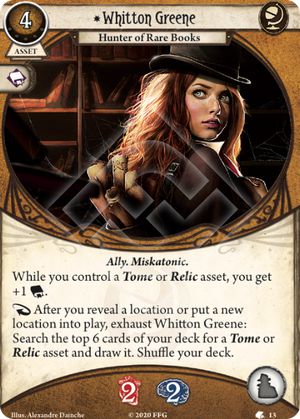
Whitton Greene suffers from the same problem as Jake Williams, in that (depending on the scenario) it can be hard to trigger her reaction consistently. And if you want to benefit from her boost, you need to be confident of finding a Tome or Relic on one of those (infrequent) searches, or drawing one by other means.
But! All is not lost! There's one investigator who can put a new location into play whenever he pleases, and who starts the game with a Relic in play: Luke Robinson!
Granted, an -focused Luke deck is probably never going to be as strong as a proper deck (or a -focused Luke deck), but I think this will be a fun pairing nevertheless. :-D



